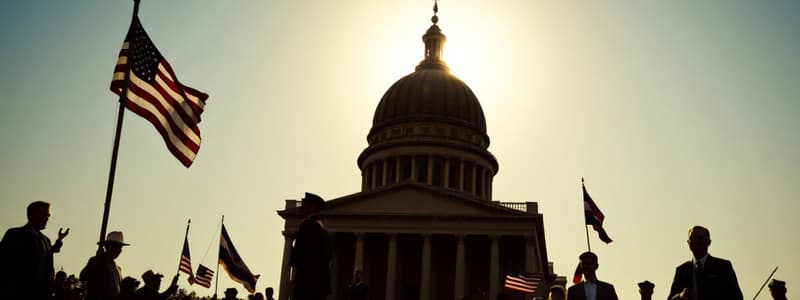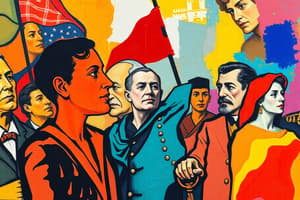Podcast
Questions and Answers
Who were the major players involved in the Westward Migration?
Who were the major players involved in the Westward Migration?
- Groups
- Acts that encouraged it
- Impact on nature
- All of the above (correct)
What were some examples of American imperialism in the 1800s?
What were some examples of American imperialism in the 1800s?
The Spanish-American War, the annexation of Hawaii, and the building of the Panama Canal.
Which of the following is NOT a Progressive Amendment?
Which of the following is NOT a Progressive Amendment?
- 19th Amendment (Women's suffrage)
- 18th Amendment (Prohibition) (correct)
- 16th Amendment (Income Tax)
- 17th Amendment (Direct Election of Senators)
What were the major alliances involved in World War I?
What were the major alliances involved in World War I?
The United States accepted the Treaty of Versailles.
The United States accepted the Treaty of Versailles.
What were the major causes of the Great Depression?
What were the major causes of the Great Depression?
Which of the following was NOT a major turning point of World War II?
Which of the following was NOT a major turning point of World War II?
What was the 'turning point' of the atomic bombing of Japan?
What was the 'turning point' of the atomic bombing of Japan?
What were the major aspects of the Cold War?
What were the major aspects of the Cold War?
Which of these events is NOT related to the Cold War?
Which of these events is NOT related to the Cold War?
What were the major aspects of the Affluent Society in the 1950s?
What were the major aspects of the Affluent Society in the 1950s?
Which event was a major turning point in the Vietnam War?
Which event was a major turning point in the Vietnam War?
What was the Triangular Diplomacy implemented by Richard Nixon?
What was the Triangular Diplomacy implemented by Richard Nixon?
Which of these events was NOT related to Richard Nixon's presidency?
Which of these events was NOT related to Richard Nixon's presidency?
The MiG-25 vs. F-15 Development was a significant moment in the Space Race between the US and the Soviet Union.
The MiG-25 vs. F-15 Development was a significant moment in the Space Race between the US and the Soviet Union.
Flashcards
Robber Barons
Robber Barons
Industrialists of the late 19th century who amassed great wealth, often by exploiting workers and/or using unethical business practices.
Populist Party
Populist Party
A political party advocating for farmers, laborers, and the common people against the wealthy elite.
Westward Migration
Westward Migration
The movement of people from the eastern to the western part of the United States, driven by economic opportunities and expansion.
American Imperialism
American Imperialism
Signup and view all the flashcards
Spanish-American War
Spanish-American War
Signup and view all the flashcards
Progressive Policies
Progressive Policies
Signup and view all the flashcards
Progressive Amendments
Progressive Amendments
Signup and view all the flashcards
Election of 1912
Election of 1912
Signup and view all the flashcards
Women's Suffrage
Women's Suffrage
Signup and view all the flashcards
Temperance
Temperance
Signup and view all the flashcards
World War I
World War I
Signup and view all the flashcards
Treaty of Versailles
Treaty of Versailles
Signup and view all the flashcards
Roaring Twenties
Roaring Twenties
Signup and view all the flashcards
Dawes Plan
Dawes Plan
Signup and view all the flashcards
Great Depression
Great Depression
Signup and view all the flashcards
World War II
World War II
Signup and view all the flashcards
Cold War
Cold War
Signup and view all the flashcards
Berlin Blockade
Berlin Blockade
Signup and view all the flashcards
McCarthyism
McCarthyism
Signup and view all the flashcards
Affluent Society
Affluent Society
Signup and view all the flashcards
Cuban Missile Crisis
Cuban Missile Crisis
Signup and view all the flashcards
Great Society
Great Society
Signup and view all the flashcards
Vietnam War
Vietnam War
Signup and view all the flashcards
Watergate Scandal
Watergate Scandal
Signup and view all the flashcards
Triangular Diplomacy
Triangular Diplomacy
Signup and view all the flashcards
Soviet Invasion of Afghanistan
Soviet Invasion of Afghanistan
Signup and view all the flashcards
Study Notes
History 1302 Final Exam Study Guide
- Exam Format: Comprehensive, in-class, no notes permitted. Section 1 & 2 (60 points) - 50 multiple choice questions (1 point each) and 10 matching questions (1 point each).
Unit 1 (Chapters 16-20)
- Robber Barons: Focus on industrialists and their industries.
- Populist Party: Details of this political party.
- Westward Migration: Groups involved, acts encouraging it, environmental impact.
- Imperialism (1800s): Spanish-American War, examples of American expansion.
- Theodore Roosevelt & Progressive Policies: Details on Roosevelt's policies.
- Progressive Amendments: Information on these amendments.
- Woodrow Wilson: Information on Woodrow Wilson
- 1912 Election: Focus on the candidates and the results.
- Women's Suffrage: Key figures and events in the suffrage movement.
- Temperance (Prohibition): Issues surrounding prohibition, and the effects.
Unit 2 (Chapters 21-24)
- World War I: Causes, major alliances, American entry, and America's contribution.
- Treaty of Versailles: Terms imposed on Germany, and reasons US rejected it.
- Roaring Twenties: New products and technologies. Impact of automobiles.
- Dawes Plan: Social and Economic impact of the Plan.
- Great Depression: Causes, initial government responses (Hoover).
- World War II: Causes, major alliances, turning points, and the atomic bombings.
Unit 3 (Chapters 25-30)
- Early Cold War: Truman and Eisenhower administrations. Formation and role of the UN.
- Berlin Blockade: Details and significance.
- McCarthyism and 2nd Red Scare: Focus on the period and its characteristics.
- Affluent Society: New consumer goods and 1950's culture.
- JFK Administration: Bay of Pigs, Cuban Missile Crisis.
- LBJ Administration: The Great Society, Vietnam War involvement.
- Vietnam War: American involvement under LBJ and Nixon.
- Richard Nixon: Triangular Diplomacy, Watergate Scandal.
- Israel and Shuttle Diplomacy: Israeli history, diplomatic relations.
- Iran Hostage Crisis: Details on this historical event.
Section 4 (IDs/Short Answer)
- Format: Essay format, focusing on identifying individuals, describing events, location, and significance.
- Examples: Berlin Blockade, Watergate Scandal, Soviet Invasion of Afghanistan, Great Society, Triangular Diplomacy, MiG-25 vs. F-15 Development.
Section 3 (Map Questions)
- Format: Identify 10 US states from the Mexican Cession that are located on the Middle East map.
Studying That Suits You
Use AI to generate personalized quizzes and flashcards to suit your learning preferences.




